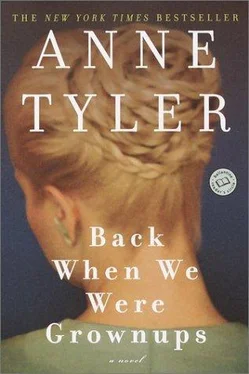In fact, it seemed a bit early. What if she and Will were to linger over coffee? What if they returned to the parlor after supper and started… Well, not that they’d be doing anything very private, of course, but what if they just wanted to talk without other people listening? She couldn’t say this to Zeb, though, because he’d already rearranged his schedule to help her out. “That’ll be fine,” she told him. “It’s good of you to take him, Zeb.”
He said, “Jesus, it’s the least I can do. So. Is this a… what. Is this an actual date you’re having?”
“No, no! Mercy,” she said. “I’m much too old to be dating.”
“Is that right,” he said mildly, and then he called, “Poppy? You ready?”
Poppy emerged from the rear of the house, patting all his pockets with the hand that wasn’t holding his cane. Every pocket rustled. He had taken to insisting, lately, on bringing a supply of candy bars on his outings. Evidently he feared being caught in some emergency situation with no source of sweets. “I’m all set,” he announced. “Going to have a boys’ night out,” he told Rebecca.
“Good, Poppy. Enjoy yourselves, you two.”
As soon as she had closed the door behind them, she raced up the stairs to her bedroom. She had decided that the caftan was too informal. It might even be mistaken for sleepwear. She changed into a silk blouse and a floor-length hostess skirt, and she switched her clunky leather sandals to daintier ones, high-heeled.
Her room looked ransacked. Cast-off clothes littered the bed, and half a dozen pairs of shoes were strewn across the floor. In the mirror, her face had the bright-eyed, hectic expression of someone who’d been nipping at the sherry.
Well before six, the doorbell rang. It was so early that she feared a drop-in family visitor. But no, when she opened the door, there stood Will, practically invisible behind a gigantic plant of some kind. “Oh! You shouldn’t have,” she said.
“I know I’m early,” he told her. “I allowed a little extra time in case I got lost.”
“That’s all right! Let’s see, maybe you could set that here on the floor by the… Isn’t it unusual!”
In fact, the plant was bizarre. Three feet tall, at least, with monstrous, lumpy, dark-green leaves speckled a sulphur yellow, it loomed from a red-rimmed white bowl that reminded her of a chamber pot. Once Will had set it down, it blocked nearly all the light from the foyer window. “What is it called?” she asked.
Will spread his arms helplessly. “I don’t know,” he said. “They told me it was impossible to kill, was all.”
“Oh, good.”
His white curls and lined forehead shocked her all over again. (In her mind, she seemed to keep returning him to his youth.) His palms were dusted with potting soil. He was wearing faded jeans with a short-sleeved, gray plaid shirt, and on his feet were mammoth jogging shoes. He must have seen her glance at the shoes, because he said, “I guess I should have dressed up more.”
“Nonsense! I’m not dressed up.”
She led him into the parlor, walking as quietly as possible so he wouldn’t notice her heels. “Have a seat,” she said. “Can I offer you something to drink?”
“No, thanks.”
He sat down on the sofa, first carefully tweaking the knees of his jeans as if they had a crease, which they didn’t. Then he gazed around him at the crystal chandelier, the damask draperies, the Oriental carpet. “This is really very… This is quite a place,” he said.
“Yes, well, don’t let it fool you,” she told him. She chose to settle not on the sofa beside him but in the wing chair to his left, to her own surprise. Then she tugged her skirt up a bit so it wouldn’t seem floor-length, but when she remembered she was wearing knee-high nylons she lowered it again. “Any minute now,” she said, “I expect the roof to fall in.”
“Is that picture above the mantel an ancestor of your husband’s?”
He was referring to a portrait of a woman in a hoopskirt, with an obstinate, thick-necked look to her. “No,” Rebecca said, “I think they bought it at a garage sale.”
“Well, still, it’s… the whole place is very impressive.”
“Tell me, Will,” she said. “Have you kept in touch with any of our old college friends?”
She had thought up this topic ahead of time. It seemed a neutral one, and certain to fill several minutes, at least. But he just said, “No, not really.”
“Your roommate, for instance? Don Grant? Or Horace what’s-his-name?”
“No.”
“Oh. Well, me neither,” she said. “But I was assuming that in my case, it was because of… you know. Because of dropping out and getting married and all.”
“I’ve never been very sociable,” Will told her. He didn’t seem to have his mind on what he was saying; he was still gazing around the room. He said, “This house must have quite a—”
The doorbell rang. He looked at her. “Quite a history,” he said. And then, when she didn’t move, “I believe your doorbell rang.”
“Oh,” she said. “Right.”
She rose and went to answer it.
Mr. Quint, from Second Eden, scraped his perfectly dry feet on the mat before he stepped into the foyer. “Just wanted to let you know I’ve set my men to working out back,” he told her. “I did say we’d be — What is that? ”
He meant Will’s plant. He drew back as if he thought it might bite.
Rebecca said, “I’m not sure, exactly. Wouldn’t that be your department?”
“Mine? Lord, no. I’ve never seen anything like it.” He kept on staring at it in a perplexed and worried way even as he picked up where he had left off. “I did say we’d be here by noon, but we’ve been running a tad bit late today.”
“That’s okay,” she told him. To be honest, she had forgotten he was coming.
“We can finish up before dark, I’m just about certain. You want to take a peek at them azaleas I was talking about?”
“No, I’m sure they’ll be fine.”
“Not that they’ve got any blossoms this time of year anyhow, but there’s these little hang tags, you know? With color photos on them.”
“It doesn’t matter. Really.”
“Or why don’t I just pull off a tag and bring it in to show you? I’ll go round back right now and fetch it.”
“I don’t care about it!” she said.
“Oh.”
“I have company.”
“Suit yourself,” he said. “As long as you don’t come running to me after you see them in bloom.”
He still had his eyes on the plant as he turned to leave.
In the parlor, she found Will standing at the piano. He pressed one chipped, crackled key until a note plinked out.
“I know it’s a little flat,” she said. (In high school, Will had been famous for having perfect pitch.)
He said, “Oh, well.”
“Our guests seem to like that sort of honky-tonk sound — that dance-hall, tinny, plunky sound. At every party, just about, someone will sit down to play.”
Will closed the piano lid. He said, “You used to be so shy at parties.”
Probably this was just a meaningless remark, but she read it as an accusation. How could she have changed so much when he had remained the same? he might be asking. She said, “I’m no different now! I promise. It’s just, you know, when parties are your livelihood—”
The telephone rang.
She said, “Why don’t we let the machine get that.”
There was a second ring. A third.
Too late, she recollected that the machine was not turned on. The telephone kept ringing, and Will kept looking at her.
“So!” she said. “I should go see to our supper. Would you like to come out to the kitchen?”
“Certainly,” Will said. “Can I help?”
Читать дальше












